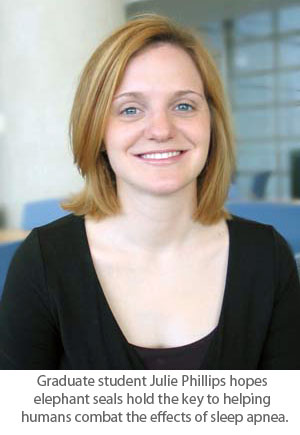

About 18 months into her
Ph.D.program at UC Merced, Julie Phillips has learned one thing for sure: Elephant seals are more entertaining than the Eastern fence lizards she worked with for her master’s thesis.
“They’re pretty fat, and they just lie there and look at you,” she said. “It’s almost like they’re saying, “I know you can’t pick me up. It’s fun to go out and watch them interact and make their noises.”
Phillips has been visiting the elephant seal pups at Antildeo Nuevo State Natural Reserve, 55 miles south of San Francisco, learning how to collect plasma samples to study their endocrine system during the early and late phases of fasting, an annual component of their life history.
She noted the size of a particular class of pups, “super weaners” who find second mothers to nurse from after their own mothers have weaned them.
“They’re about 200 kilos - that’s about 440 pounds,” she said.
As she learns to be around the seals and collect samples properly, she’s preparing for certifications necessary to work with the animals.
“Next year I should be able to collect the samples myself,” she said.
Specifically, she wants to learn how elephant seal pups manage their considerable sleep apnea without the cardiovascular effects that similar apnea creates in humans. The pups sometimes stop breathing for 9 to 10 minutes as they sleep. When humans have apnea that severe, they are at high risk of dying from cardiovascular damage. The seal’s endocrine systems may offer humans knowledge about how to sever that connection.
Phillip’s research is supervised by
Professor Rudy Ortizof the
School of Natural Sciences.
Phillips has been selected to attend Trainee Day at the June meeting of the Endocrine Society in San Francisco in connection with her elephant seal work. She’ll interact there with medical and pharmacy students as well as other Ph.D. students in the field of endocrinology. Her selection includes a travel award as well as free registration for the conference.
She’s also waiting for word on an award from the National Institutes of Health to underwrite her research.
UC Merced is working out well for Phillips and her husband, who is a Ph.D. student in
computer science and engineering.
And they’re doing their best to give back. They started a Capoeira (Afro-Brazilian martial arts and dance) class a year ago at the Merced Multicultural Arts Center. The class has garnered some dedicated attendees, but Phillips says there’s room for more.
It’s a good way to keep fit. Maybe the “super weaners” should give it a try.






